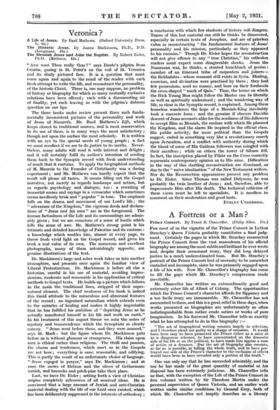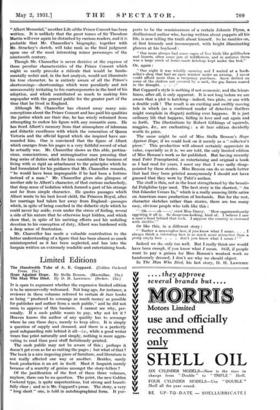A Fortress or a Man ?
Prince Consort. By Frank B. Chancellor. (Philip Allan. 21s.)
FOR most of us the vignette of the Prince Consort in Lytton Strachey's Queen Victoria probably constitutes a final judg- ment. Certainly the pages in which Mr. Strachey resurrected the Prince Consort from the vast mausoleum of his official biography are among the most subtleand brilliant he ever wrote
and, despite their occasional irony, they did long delayed justice to a much underestimated 'man. But Mr. Strachey's portrait of the Prince Consort had of necessity to be somewhat curtailed and incomplete, since he was primarily engaged upon a life of his wife. Now Mr. Chancellor's biography has come to fill the gaps which Mr. Strachey's compression made inevitable.
Mr. Chancellor has written an extraordinarily good and
extremely, sober life of Albert of Coburg. The opportunities which the Prince Consort's character affords for flippancy and a too facile irony are innumerable. Mr. Chancellor has not succumbed to them, and this is a great relief in these days, when works presented as biographies are unfortunately so often indistinguishable from rather crude satires or works of pure imagination. In his foreword Mr. Chancellor tells us exactly what he has attempted to do in this biography :— "The art of biographical writing consists largely in selection, and I therefore plead not guilty to a charge of omission. It would have been easy to have presented the Prince either as a saint or as "-a dangerous schemer, to have concentrated on the domestic aide of his life or on the political, to have made him appear a man of action or a- dreamer. -Bat the art of- biography also consists, so far as is possible, in telling the whole truth, and to have por- trayed one side of the Prince's character to the exclusion of others would have been to have revealed only a portion of the truth."
One can only say that he has succeeded admirably, and the use he has made of the great quantity of material at his
disposal has been extremely judicious. Mr. Chancellor tells us that, with the exception of the Life of the Prince Consort in five volumes written by Sir Theodore Martin under the personal supervision of Queen Victoria, and an earlier work written under similar conditions by General Grey, both of which Mr. Chancellor not inaptly describes as a literary "Albert Memorial," no other Life of the Prince Consort has been written. It is unlikely that the great tomes of Sir Theodore Martin will ever again be disturbed by curious readers, and it is probable that Mr. Chancellor's biography, together with Mr. Strachey's sketch, will take rank as the final judgment upon one of the most interesting minor personages of the nineteenth century.
Though Mr. Chancellor is never derisive at the expense of those peculiar characteristics of the Prince Consort which might so easily provoke a ridicule that would be funda- mentally unfair and, in the last analysis, would not illuminate his true character, he is entirely aware of all the Prince's shortcomings—shortcomings which were peculiarly and not unreasonably irritating to his contemporaries in the land of his adoption, and which contributed so much to making him unpopular with the general public for the greater part of the time that he Hied in England.
Although Mr. Chancellor has cleared away many mis- conceptions about the Prince Consort and has paid his qualities the justice which are their due, he has wisely refrained from attempting to endow his figure with any romantic aura. He has freed Albert's memory from that atmosphere of inhuman and didactic excellence with which the veneration of Queen Victoria and the official legend which she inspired have sur- rounded him. One is convinced that the figure of Albert which emerges from his pages is a very faithful record of what he actually was. Mr. Chancellor shows us this able, pertina- cious, conscientious, and unimaginative man pursuing that long series of duties which for him constituted the business of living with so rigid an attachment to the principles which he had formulated for his guidance that Mr. Chancellor remarks, "he would have been impregnable if he had been a fortress instead of a man." Mr. Chancellor gives also glimpses of another side to Albert's character, of that curious melancholy, that deep sense of isolation which formed a part of his strange and far from simple character. He quotes passages which Albert wrote to his best loved child, the Princess Royal, after her marriage had taken her away from England—passages which, in spite of being couched in the didactic style which he could never lay aside, even under the stress of feeling, reveal a side of his nature that he otherwise kept hidden, and which show that, in spite of his untiring efforts and his unfailing devotion to his conception of duty, Albert was burdened with a deep sense of frustration.
Mr. Chancellor has made a valuable contribution to the better understanding of a figure that has been almost as much misinterpreted as it has been neglected, and has into the bargain written an extremely readable and entertaining book.





































 Previous page
Previous page